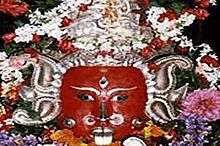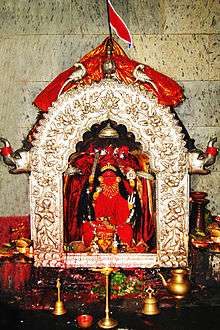Majhighariani Temple
Majhighariani Temple is an important shrine for Devi in the Rayagada township of Odisha.[1] It was built by King Vishwanath Dev Gajapati of the Suryavansh dynasty of Nandapur - Jeypore kingdom. It is believed that he made Rayagada his capital and after the construction of the temple and blessings of the goddess he went on to conquer a vast dominion and expanded his kingdom from parts of Bengal to Telangana in south.[2]
| Maa Majhighariani Temple | |
|---|---|
ମା ମଝୀଘରିଆଣୀ ମନ୍ଦିର | |
 Maa Majhighariani Temple | |
| Religion | |
| Affiliation | Hinduism |
| Deity | Maa Majhi Ghariani |
| Festivals | Durga Puja and Chaitra Puja |
| Location | |
| Location | Rayagada |
| State | Odisha |
| Country | India |
 Location in Odisha | |
| Geographic coordinates | 19°9′36.121″N 83°24′28.044″E |
| Architecture | |
| Type | Kalinga Architecture |
| Specifications | |
| Temple(s) | 7 |
| Elevation | 219 m (719 ft) |
| Website | |
| https://rayagada.nic.in/tourist-place/maa-majhighariani-temple/ | |
Many people come to the shrine from Chhattisgarh, Andhra Pradesh along with people from Odisha. The legend says Devi is worshipped from centuries whereas the temple is a new one. Every Sunday, Wednesday, and Friday the temple draws a large crowd from nearby area. Dussehra in October and Chaitra parva is most famous in March–April. The nearest railhead is Rayagada. People who have unfulfilled wishes come here and stay for many days for worship.
History
Rayagada appeared as far back as the reign of King Samudragupta who tried to claim her. The scars of these battles are still there at today's Champikota, a thirty minutes' ride from the town. Such is her ancient lore. Such is her modern tale. Goddess Majhighariani (Also known as Majji Gouri) is evidently the prime deity here. She commands the soulful population. The origin of the Goddess is associated with a historical event dating back to the fourth century A.D. The Odisha Gazetteer says, Samudragupta invaded Mahakantara, the modern Koraput and Kalahandi tracts. King Vyaghraraj of Mahakantar braved the battle with success. People today believe that he did it with the grace of the Goddess. The Goddess continued to be worshipped since then as a form of Shakti, energy incarnate. Shakti and the mother figure are synonymous in the mind of a Hindu. Therefore, almost in no time the Goddess was accepted as the universal mother. Mr. N.C.Padhi, a Teacher of G.C.D High School Rayagada has done copious research on the deity.[3][4] He quotes the Odisha Gazetteer that “in the fourteenth century the Suryavanshi king Viswanath Dev Gajapati chose Rayagada as his capital and shifted his headquarters to that new town from Nandapur. He built an enormous fort at devotion of the entire Rayagada the ruins of which are still seen. Viswanath Gajapati also constructed rows of temples along the river Nagavali and the ruined temple called Majhi Ghariani is also attributed to the Goddess right in the middle of his palace and the temple was raised later at that very spot. Hence, the name Majhi Ghariani, or the one seated in the central room. The construction of the temple (The structure as we see today) is of very recent origin, say, about forty years. At that time the railways were building a bridge over the Nagavali at a stone's throw from the shrine because at this point the river is a deep and narrow gorge going down around a hundred and odd feet. To the surprise of the builders, the massive piers gave way as many as three times. And then the head Pujari one night had a dream in which the deity commanded that her temple be built first. It was raised forthwith. Legend goes that the bridge too could be completed afterwards with no further difficulty.
References
- KBS Singh (1939). Nandapur A Forsaken Kingdom. Utkal Sahitya Press. ISBN 978-81-86772-17-1.CS1 maint: ref=harv (link)
- Rao, M.S. (September 2009). "Goddess Majhi Ghariani of Rayagada" (PDF). Orissa Review: 13–15. Retrieved 16 July 2018.
- KBS Singh 1939, p. 17.
- "Maa Majhighariani, Rayagada". www.groups.google.com. Retrieved 16 July 2018.
- "Rayagada". www.rayagada.nic.in. Retrieved 16 July 2018.
